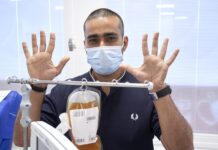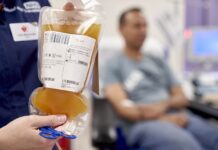
An awareness drive to educate people about the UK’s biggest genetic blood disorder has been launched in Leicestershire and the East Midlands to coincide with an international campaign.
Resources have been made available to educate people and raise awareness of sickle cell disease ahead of World Sickle Cell Day, which takes place on Monday, 19th June.
The condition is a genetic blood disorder affecting about 15,000 people in England, but two out of three people with it say doctors and nurses are not providing enough information, according to the first national survey into the condition.
The campaign has been organised by NIHR Collaboration for Leadership in Applied Health Research and Care (CLAHRC) East Midlands. The organisation is a collaboration of NHS, universities, patients and industry turning research into cost-saving and high-quality care through cutting-edge innovation.
Resources have been shared on the CLAHRC East Midlands website, including an infographic factsheet called ‘Living with Sickle Cell Disease’.
Professor Kamlesh Khunti, Director of CLAHRC East Midlands and Professor of Primary Care Diabetes & Vascular Medicine at the University of Leicester, said: “Sickle cell disease is often invisible in nature, people look well despite experiencing regular episodes of excruciating pain; but it is a serious long-term condition and is the UK’s biggest genetic blood disorder.
“This first-ever nationwide survey has been vitally important in helping us to understand the experiences of those living with the condition so we can identify how we can improve their care. On the back of the survey, we have planned some events to help increase awareness and knowledge of the condition in Leicestershire.”
A spokesman for the Sickle Cell Society added: “A lack of awareness can have a devastating impact on sickle cell patients. World Sickle Cell Day provides an opportunity to raise awareness of the disorder to families and the professionals who take care of them. We welcome Leicestershire’s awareness drive, and we hope it will help make this invisible illness more visible.”
The survey was carried out by the charity the Picker Institute Europe and was commissioned by NIHR Collaboration for Leadership in Applied Health Research and Care Northwest London hosted by Chelsea and Westminster Hospital NHS Foundation Trust and whose lead academic partner is Imperial College London and, in partnership with the Sickle Cell Society.
People with sickle cell disease and their families told researchers that greater awareness of the condition and more information about coping with pain and treatment options would improve their experiences.
The survey of 722 people also revealed poor understanding and knowledge of the condition from staff in emergency care settings compared to specialist-led healthcare staff.
A total of 62 per cent of those surveyed reported that healthcare staff did not give enough information to others, such as schools or employers about their condition.
Additionally, 38 per cent of respondents felt they did not have enough information about coping with pain.
Sickle cell disease is the name for a group of inherited conditions that affect the red blood cells, the most serious type is called sickle cell anaemia.
It mainly affects people of African, Caribbean, Middle Eastern, Eastern Mediterranean and Asian origin. In the UK, it is particularly common in people with an African or Caribbean family background.
People with sickle cell disease produce unusually shaped red blood cells that can cause problems because they do not live as long as healthy blood cells and they can become stuck in blood vessels.















